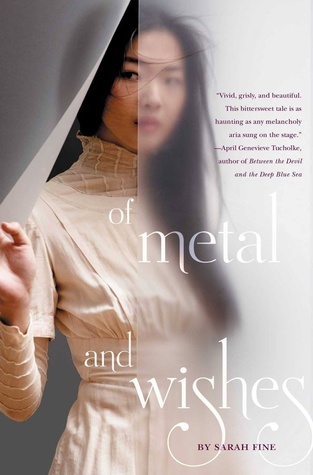
🎃 Read for the Unapologetic Romance Readers Halloween 2017 Reading Challenge for the category of: a steampunk romance 🎃
I was wary about picking this one up because two reviewers I almost always agree with, Heather and Khanh, both gave this a pretty negative review. Also, it's steampunk and YA - two genres I often have issues with. Paired together? It seemed like too much. But THEN I found out that this was a Phantom of the Opera retelling and I was like, "Dude, I love that shiz."
But did I really love that shiz? After all, I think we all remember what happened when I tried to read ROSEBLOOD.
OF METAL AND WISHES has a pretty cool concept. It's set in this industrial universe, chopped up into districts that serve out various functions. Wen, the main character, is the daughter of the doctor/surgeon who works inside a slaughterhouse.
The workers are a different race than Wen's people, called "the Noor" and are dehumanized, called animals and barbarians by the people in the more prestigious roles. But Wen quickly finds sympathy with them because one of them, Melik, is hawt. He's not the "phantom," though. That role belongs to a mysterious figure called "Ghost" who haunts the slaughterhouse, answering the wishes of those who leave offerings at his shrine. Ghost allegedly died in a factory accident years ago, and while some laugh off those claims, mysterious things happen in the factory. Dangerous things. Deadly things.
I'm still laughing about The Phantom of the Slaughterhouse. I'm trying to decide if that's better or worse than The Phantom of the Rave. Probably worse, because neon lights and strobes can be pretty freaky, but it's hard to take a phantom seriously when he's trying to push his way through a bunch of swinging meat carcasses while still trying to look intimidating (note: this did not actually happen, but oh man, it would have been hilarious if it did - like Adam Levine in Animals).
OF METAL AND WISHES tries to tackle racism and rape culture but it fails at both because of some really bad mixed messages. Wen has all kinds of bad things to say about women who sell their bodies, and the men who take them up on that offer, but from her position of privilege it comes off as incredibly insensitive. Especially when she is put into that position later, multiple times (virtually all the men in this book are creeps). She holds herself to a different standard because she is "pure": as if being virginal somehow makes you less deserving of abuse and sexual harassment, which is an absolutely terrible mindset to have.
The racism, likewise, also feels very awkward. Wen comes across as very superior and sanctimonious, and when she feels betrayed by Melik, she's quick to resort to her old, racist beliefs as a means of channeling her rage. Which is realistic in a sense - people often show their true, racist colors when they're angry. But it just seemed to underscore the fact that Wen saw Melik - and the Noor - as being beneath her, and I never really got a sense that she had changed much as a person, even at the end of the book. She was still selfish and awful and judgemental.
Perhaps that could have been forgivable if the story had been better, but it wasn't. The pacing was very slow. The world-building was original, and reminded me of the grim, caste-segregated steampunk stories that Paolo Bacigalupi is well-known for, but Sarah Fine did not flesh out the world enough, and it felt more like a backdrop than a well-developed world. What a shame that was, because a dark and dangerous factory and creepy mechanical spiders could have served as the setting for a modern day Jungle, a la Sinclair Lewis. But this ended up feeling like yet another cliche, wallpaper YA forbidden love story masquerading as a dystopian.
1.5 out of 5 stars
No comments:
Post a Comment
Note: Only a member of this blog may post a comment.